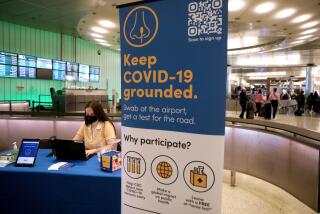Foreign Airlines Face New U.S. Scrutiny
WASHINGTON â Citing national security concerns, the U.S. Customs Service on Thursday began tough new scrutiny of baggage and travelers on dozens of foreign airlines that have failed to provide U.S. authorities with advance details about their passengers.
The move follows U.S. demands that 58 airlines from the Middle East, Russia, China and elsewhere provide the name, birth date, gender, travel plans and other information on each passenger before landing in this country. Most of the airlines have yet to comply, customs officials said Thursday.
Among the first to get the tougher treatment were passengers on a China Eastern Airlines flight to Los Angeles International Airport on Thursday morning, a Saudi Arabian Airlines flight to John F. Kennedy International Airport in New York and others headed for Miami and Washington.
Such flights âpose a national security risk to the United Statesâ if the airlines do not forward the passenger information, U.S. Customs Commissioner Robert C. Bonner warned in a statement. Customs, he added, plans â100% examinations of all people and luggage disembarking these particular flights.â
New Law Requires Electronic Data
Passengers arriving at LAX on Thursday afternoon on an Air Pacific flight from Fiji were directed to a special line after retrieving their luggage. Officials took almost two hours to clear the line, and some passengers grew impatient after the 10-hour flight, said passenger Heather Fenstermaker, a college student from Seattle.
Although she and a companion waited more than an hour while inspectors hand-checked their eight bags, she did not complain. âIâm glad,â said Fenstermaker, 19, who stood near the front of the line and had a shorter wait than many of the 274 passengers and crew members. âIt is safer that way.â
Inspectors were looking for unusual materials, documents that might tie travelers to suspect activities, prohibited merchandise and âanything along the lines of explosives,â said Nat H. Aycox, acting port director at LAX for the U.S. Customs Service. LAX receives as many as eight flights a day from airlines that are not filing their passenger lists electronically.
The issue heated up this month when Congress passed aviation security legislation that requires airplanes arriving from outside the United States to relay passenger data electronically, thus enabling customs inspectors to look for potential risks before flights reach the United States. The Advance Passenger Information System began in 1988, but participation had been voluntary, and some overseas carriers have ignored U.S. requests to join in the effort.
Under the program, airlines submit passenger data when a plane takes off for the United States. Inspectors are able to check the names of travelers against an array of law enforcement databases and target particular passengers for closer examination when they reach a U.S. port of entry.
Many airlines already participate; customs gets advance information on 85% of passengers arriving on international flights. The legislation gave the remaining airlines until Jan. 18 to comply. Customs chose to move early, concerned that public knowledge of the January date could provide terrorists a window of opportunity to enter the United States.
In letters sent Nov. 19 to 58 carriers, most of them foreign, Bonner urged the airlines to participate. âWe recognize that the vast majority of travelers are not a threat to the United States,â he wrote. âHowever, we believe that in the wake of Sept. 11, international flights pose a serious national security risk to the United States if carriers do not provide comprehensive and accurate . . . data.â
Airlinesâ Compliance Has Been Spotty
Under the new law, customs had the authority to conduct inspections of flights that do not provide advance data, he said, and he told the airlines that these inspections would begin Thursday.
More pointedly, officials warned that travelers on airlines that do not provide the information were likely to face significant delays when they reach the United States.
âEach person will be asked questions, and each piece of luggage will be looked at,â Kevin Bell, a Customs spokesman, said Thursday. âTheyâre going to face long lines.â
The stricter inspections required to enter the United States could possibly add hours to a process that had often taken just minutes for many travelers.
U.S. officials warned Thursday that the airlines risked more than inconvenience, however, and could be grounded in January.
âIf they donât do it by Jan. 18, we can revoke their landing rights,â Bell said. âItâs definitely a possibility. I would say itâs very likely.â
There were indications Thursday that the message was getting through. Although officials at the Saudi Arabian Embassy reportedly have chafed at the new policy, an executive for Saudi Arabian Airlines in North America sounded a cooperative note.
âAs an airline, weâre working with the appropriate officials to put in place the procedures that are required, and we will be doing it,â said Tom Quinn, the airlineâs head of marketing and sales for the Americas.
Of the 58 airlines targeted, 16 have indicated their intention to comply, but officials said that some of those had not yet followed through with the actual procedures. Those signaling their plans to cooperate included Air China, Pakistan International Airlines and Royal Jordanian Airlines.
While foreign airlines are the primary focus of the new policy, several U.S.-based carriers with Mexican and Canadian flights also are targeted, including America West, Midwest Express, American Trans Air and Horizon Air. The largest U.S. carriers, such as United, Delta and American, already provide the information.
Times staff writer Jeffrey L. Rabin in Los Angeles contributed to this report.
More to Read
Sign up for Essential California
The most important California stories and recommendations in your inbox every morning.
You may occasionally receive promotional content from the Los Angeles Times.










